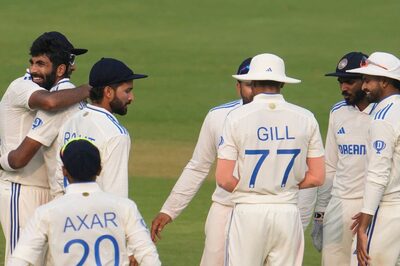
views
“Doveryai, no proveryai” (Trust, but verify) are the famous words with which President Ronald Reagan had greeted his Soviet counterpart General Secretary Mikhail Gorbachev for their second summit in Reykjavik, Iceland, in October 1986. “Proof of the pudding is in the eating,” chirped US President Biden when asked during his press conference if he now trusted Russian President Putin, after their three-hour-long summit in Geneva on June 16. Nearly paraphrasing his illustrious predecessor, Biden remarked “trust represents self-interest and verification of self-interest.”
Both men, in their separate pressers, termed the talks as “good, positive and devoid of hyperbole” (Biden); “substantive, concrete and in an atmosphere aimed at achieving results” (Putin). The American president was trying hard not to sound too upbeat or let out that he was pleased with the outcome. Yet, he did say that there was a “genuine prospect of significant improvement in ties” and that they were “closer to commencing a major strategic dialogue” in 3-6 months, provided the sides honoured their part of the bargain.
Identify the Bigger Threat
Speaking to an American media outlet on the eve of the summit, President Vladimir Putin had said— “bilateral relationship that has deteriorated to its lowest point in recent years”. He was not exaggerating. Both sides have a laundry list of grievances against the other topped up by a sense of betrayal over election interference, cyber and ransomware attacks against American infrastructure and industries, aggression toward Ukraine and Putin’s crackdown on political opposition.
Vladimir Putin and Joe Biden are no strangers, having met each other several times in the past. “I’m not a big fan of Putin’s,” Biden had said in 2006. Despite being known as an old-school gentleman politician, Biden surprisingly used colourful language, dubbing the Russian leader a “killer” and “without a soul”.
While bilateral ties went further south, President Putin refrained from any personal counter-attacks. Tough as nails, he has been in the saddle since May 2000, and has had the measure of four American presidents, starting from Bill Clinton. Biden being the fifth. The former KGB spy is determined to restore the standing that Soviet Union (Russia) once had. Russia is a self-contained vast country and a mighty military power, unlikely to be coerced into doing something that it perceives to be against its interest. Hardy and tenacious, the Russian people are used to challenges and can take adversity on the chin.
It seeks stability, secure borders and peer-treatment by western powers. It resents being lectured to on human rights or good governance. Having served in the country twice, I can dare say that Russians respect a strong and decisive leader who can maintain national cohesion. Fissiparous tendencies had surfaced during President Boris Yeltsin’s regime. It took all the determination and ruthlessness of Putin to crush them after several years of effort.
It will also not take kindly if NATO (North Atlantic Treaty Organization) tries to box it in. The US and its western allies need to make one fundamental assessment—whether China or Russia is the real threat? The NATO 2021 communiqué has 10 references to China and 61, mostly critical, references to Russia.
Whether Russia is more sinned against than sinner can be debated till cows come home. All the same, one does not have to be a rocket scientist to discern that NATO appears determined to keep the Russian bogey alive.
Besides Crimea and Ukraine, NATO alleges that Russia’s aggressive actions constitute a threat to Euro-Atlantic security; that it is engaged in multi-domain military build-up, more assertive posture, novel military capabilities; and also that it continues to breach the values, principles, trust and commitments. NATO betrays peevishness in bemoaning that Russia and China are “also cooperating militarily, including through participation in Russian exercises in the Euro-Atlantic area”. One wonders if a similar yardstick does or does not apply to NATO.
Therefore, NATO’s protestations—that it “has worked to build a partnership with Russia … does not seek confrontation and poses no threat to Russia … (and that) … NATO BMD is not directed against Russia and will not undermine Russia’s strategic deterrence”—sound hollow.
A Successful Summit
All the same, the Geneva Summit outcome that includes sending back ambassadors to the respective posts; negotiating a major arms control agreement; initiating consultations on cyber security; starting a major strategic dialogue would be welcome across the world. Only two entities would be disappointed—the American Republican Party and China.
A Global Times editorial had opined that “during the Biden era, the US will focus on pressuring Russia, and China will have a chance to breathe”. In an essay in Foreign Affairs, veteran Chinese diplomat Fu Ying had averred that the best configuration of the US-Russia-China triangle for China would be one where the distance between the US and Russia is maximum, that between Russia and China is the shortest, and the US-China arm is of intermediate length. (Ananta Aspen)
Both sides did well to consciously play down expectations which eased the pressure on the leaders. Putin and Biden covered a fairly wide agenda, although the primary focus was contentious bilateral issues, Ukraine, Europe, Iran, China and Afghanistan (raised by Putin). They discussed at length the issue of strategic stability and agreed to launch a bilateral strategic stability dialogue—the next step needed to implement arms control measures.
In response to a barrage of critical questions from the American media, Biden’s unscripted (and tad irritated) response was quite significant. He is convinced that “Russia is in a very, very difficult spot right now. They are being squeezed by China. They want desperately to remain a major power… be relevant… it matters to almost every world leader … how they’re perceived, their standing in the world … That’s what the United States is going through right now. How do we sustain us being the leading, the most powerful, and most democratic country in the world?”
By any yardstick, the first Russia-US dialogue under Biden’s watch has been remarkably successful, reflective of meticulous preparations by his experienced ‘A’ team and and his own expertise in geopolitics. It is obvious that President Putin is also as keen to find a modus vivendi with the US and its western allies. Leader of a proud nation which has been playing a key (even if diminishing) role in shaping the global diplomatic discourse, Putin is chafing at attempts of being pushed to the margins and be seen as an appendage of China. At the same time, he remains wary of the American agenda of clipping Russia’s wings for good.
As such, Russia finds itself caught between the rock and the hard place. President Putin would have to summon all his guile and authority to extricate the nation out of this tight spot. If the West actually believes that China is a bigger threat, then there is every likelihood of forward movement. The portents seem to be good except that when it comes to the big powers, there is never a last word.
Read all the Latest News, Breaking News and Coronavirus News here.


















Comments
0 comment